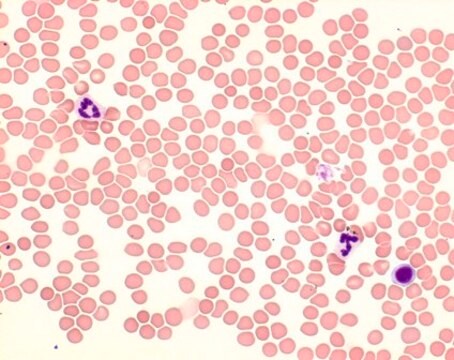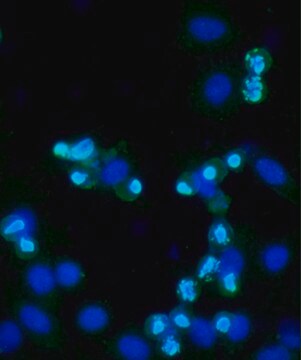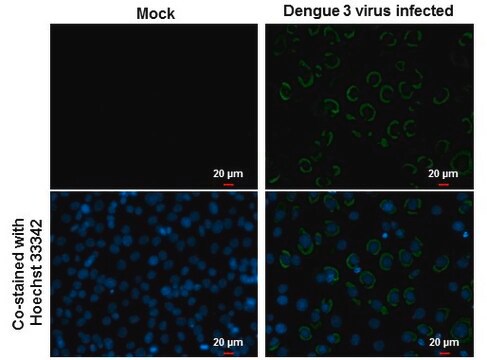MAB10216
Anti-Flavivirus Group Antigen Antibody, clone D1-4G2-4-15
ascites fluid, clone D1-4G2-4-15, Chemicon®
Sign Into View Organizational & Contract Pricing
All Photos(1)
About This Item
UNSPSC Code:
12352203
eCl@ss:
32160702
Recommended Products
biological source
mouse
antibody form
ascites fluid
antibody product type
primary antibodies
clone
D1-4G2-4-15, monoclonal
species reactivity
human
manufacturer/tradename
Chemicon®
technique(s)
immunofluorescence: suitable
isotype
IgG1
IgG2a
shipped in
dry ice
General description
The viruses of the family Flaviviridae are important arthropod-borne viruses in both human and veterinary medicine. They are transmitted by mosquito and ticks and usually are maintained in a transmission cycle in nature. They produce a broad spectrum of clinical responses in humans ranging from asymptomatic infection to fulminant encephalitis or haemorrhagic fever. Nearly 60 flaviviruses are known to exist but many are yet to be shown to cause disease in humans.
Specificity
Recognises flavivirus group specific antigens (Dengue virus, West Nile Virus, Japanese Encephalitis, Yellow Fever Virus, Zika virus etc). It binds to the fusion loop at the extremity of domain II of protein E.
Immunogen
Dengue virus type 2 antigens
Application
Anti-Flavivirus Group Antigen Antibody, clone D1-4G2-4-15 detects level of Flavivirus Group Antigen & has been published & validated for use in IF.
Legal Information
CHEMICON is a registered trademark of Merck KGaA, Darmstadt, Germany
Not finding the right product?
Try our Product Selector Tool.
Storage Class Code
10 - Combustible liquids
WGK
WGK 1
Flash Point(F)
Not applicable
Flash Point(C)
Not applicable
Certificates of Analysis (COA)
Search for Certificates of Analysis (COA) by entering the products Lot/Batch Number. Lot and Batch Numbers can be found on a product’s label following the words ‘Lot’ or ‘Batch’.
Already Own This Product?
Find documentation for the products that you have recently purchased in the Document Library.
Qian Chen et al.
Nature communications, 11(1), 2967-2967 (2020-06-13)
The recent outbreak of Zika virus (ZIKV) was associated with birth defects and pregnancy loss when maternal infection occurs in early pregnancy, but specific mechanisms driving placental insufficiency and subsequent ZIKV-mediated pathogenesis remain unclear. Here we show, using large scale
V Haridas et al.
PLoS neglected tropical diseases, 7(1), e2005-e2005 (2013-01-26)
Japanese encephalitis virus (JEV) is a major cause of viral encephalitis in South and South-East Asia. Lack of antivirals and non-availability of affordable vaccines in these endemic areas are a major setback in combating JEV and other closely related viruses
A Viral Polymerase Inhibitor Reduces Zika Virus Replication in the Reproductive Organs of Male Mice.
Sofie Jacobs et al.
International journal of molecular sciences, 20(9) (2019-04-30)
In humans, Zika virus and viral RNA have been detected in semen up to 2.2 months and 6 months post infection (pi), respectively. Although the contribution of sexual transmission to the spread of ZIKV is too low to sustain an
Andreas S Puschnik et al.
Cell reports, 21(11), 3032-3039 (2017-12-16)
The mosquito-borne flaviviruses include important human pathogens such as dengue, Zika, West Nile, and yellow fever viruses, which pose a serious threat for global health. Recent genetic screens identified endoplasmic reticulum (ER)-membrane multiprotein complexes, including the oligosaccharyltransferase (OST) complex, as
José A Aguilar-Briseño et al.
Nature communications, 11(1), 3177-3177 (2020-06-25)
Vascular permeability and plasma leakage are immune-pathologies of severe dengue virus (DENV) infection, but the mechanisms underlying the exacerbated inflammation during DENV pathogenesis are unclear. Here, we demonstrate that TLR2, together with its co-receptors CD14 and TLR6, is an innate
Our team of scientists has experience in all areas of research including Life Science, Material Science, Chemical Synthesis, Chromatography, Analytical and many others.
Contact Technical Service







